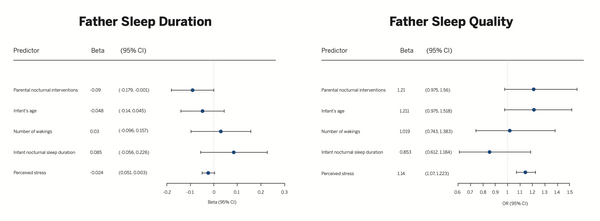Maristella Lucchini, Daianna Rodriguez, Nicolò Pini, Shambhavi Thakur, William P Fifer, Natalie Barnett
Presented at World Sleep Congress, Rome, 2022
Abstract
Introduction
Excessive parental involvement in infant sleep has been shown to have detrimental effects on infant sleep health, leading to longer sleep latency, more and longer nocturnal awakenings and shorter sleep duration. However, less is known about the associations between parental involvement in infant sleep and parental sleep health. While sleep is expected to be temporarily and partially disrupted in the postnatal period, it still serves an essential role in several physical and mental health domains for the parent and has been shown to significantly affect the parent-child relationship. Thus, we investigated the associations between parent nocturnal interventions in infant sleep and parental sleep duration and subjective quality, accounting for infant’s age, infant nocturnal sleep duration and number of awakenings, and parental perceived stress. We also investigated whether these associations differed in mothers vs fathers.
Materials and Methods
Ethical approval was obtained by the New York State Psychiatric Institute and Advarra Institutional Review Boards. The cohort was comprised of N=576 infants (age 9.1±1.8 months, 49.6% male) who were recruited among the customer base of the Nanit baby monitor. Information on infant nocturnal sleep duration, number of awakenings and parent interventions were captured via Nanit videosomnography (average nights recorded 11.9±2.2), while information on infants age, parental sleep (Pittsburgh Sleep Quality Index) and stress (Perceived Stress Scale) were collected via questionnaires on REDCap (75.8% mother, 23.6% father).
Results
Parental nocturnal sleep duration was 6.9±1.0h, parental sleep quality was 11% very good, 65% fairly good, 18% fairly/very bad. The average number of parent nocturnal interventions was 1.4±1.9 and parental perceived stress was 14.6±6.3. Infant nocturnal sleep duration was 10.2±1.2h and number night awakenings was 3.1±1.4.
More parental nocturnal interventions, higher parental perceived stress and shorter infant nocturnal sleep duration were associated with shorter parental sleep duration (parent nocturnal interventions β=-0.07±0.03, p=0.01; infant nocturnal sleep duration β=0.20±0.04, p<0.001; perceived stress
β=-0.02±0.007, p<0.001), and poorer parental sleep quality (parent nocturnal interventions β=-0.15±0.07, p=0.02; infant nocturnal sleep duration β=-0.20±0.09; p=0.02, perceived stress β=0.11±0.02, p<0.001).
When stratified by caregiver type, we found that there were no differences in parental sleep duration and quality, infants’ age, infant nocturnal sleep duration, night awakenings and number of parent nocturnal interventions between mothers and fathers, but reported levels of perceived stress differed (mothers 15.04±6.3; fathers 13.47±6.3, p=0.02). For mothers, shorter infant nocturnal sleep duration and higher perceived stress were associated with shorter sleep duration (β=0.23±0.05, p<0.001; β=-0.03±0.008, p<0.001 respectively) and worse sleep quality (β=0.23±0.05, p<0.001; β=-0.03±0.008, p<0.001 respectively). On the other hand, for fathers more parental nocturnal interventions were associated with shorter sleep duration (β=-0.09±0.04, p=0.05) and worse quality (β=-0.09±0.04, p=0.05).



Conclusions
Our results indicate that the number of parental nocturnal interventions affects parental sleep duration and quality. Stratified analyses by caregiver type, highlighted that maternal sleep is affected by perceived stress and infant nocturnal sleep duration, while paternal sleep is affected by parent nocturnal interventions. These results warrant further investigation into the potential detrimental effects of excessive parental involvement in infant sleep on parental sleep and overall health.

About the researchers
The authors include Maristella Lucchini, Daianna J. Rodriguez, Nicolò Pini Shambhavi Thakur, Wiliam P Fifer, and Natalie Barnett.

- Dr. Maristella Lucchini serves as Senior Clinical Researcher at Nanit. In her role, Maristella works to secure grant funding in collaboration with Nanit’s university research partners and supports the development of the company’s research collaborations around the world. Previously, Maristella served as an Assistant Research Scientist in the Division of Developmental Neuroscience, Department of Psychiatry at Columbia University Irving Medical Center where she led projects across several cohorts focusing on sleep health for pregnant and postpartum women and their children. Maristella’s research focused on underserved communities and sleep health disparities in the perinatal period. During her years as a postdoctoral researcher at Columbia University Irving Medical Center in the Department of Psychiatry, Maristella was selected to participate in the American Academy of Sleep Medicine Young Investigator Research Forum. She holds a Ph.D. in Biomedical Engineering from Politecnico di Milano.
- Shambhavi Thakur serves as Clinical Research Data Analyst at Nanit. She holds a Masters degree in Health Informatics and Life Sciences. She oversees the research collaborations with various universities and analyzes sleep data for internal as well as external studies.
- Dr. Natalie Barnett serves as VP of Clinical Research at Nanit. Natalie initiated sleep research collaborations at Nanit and in her current role, Natalie oversees collaborations with researchers at hospitals and universities around the world who use the Nanit camera to better understand pediatric sleep and leads the internal sleep and development research programs at Nanit. Natalie holds a Ph.D. in Genetics from the University of New England in Australia and a Postgraduate Certificate in Pediatric Sleep Science from the University of Western Australia. Natalie was an Assistant Professor in the Neurogenetics Unit at NYU School of Medicine prior to joining Nanit. Natalie is also the voice of Nanit's science-backed, personalized sleep tips delivered to users throughout their baby's first few years.

























